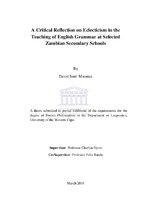| dc.description.abstract | English is the official language in Zambia and a compulsory subject from grade 1 to the final year of secondary education. Communicative competence in English is therefore critical to mobility in education and is also central to one’s job opportunities in the country. This implies that the teaching of English in schools is of paramount importance. Eclecticism is the recommended approach to teaching of English in Zambian secondary schools. However, no study had been done in Zambia on eclecticism in general, and on teachers’ understanding and application of the eclectic approach to English grammar teaching in particular. Hence, this study was a critical reflection on Eclecticism in the teaching of English language grammar to Grade 11 learners in selected secondary schools in Zambia. The aim of the study was to establish how Eclecticism in English language teaching was understood and applied by Zambian teachers of English. The study employed a mixed research study design employing both quantitative and qualitative approaches. In this regard, questionnaires, classroom observations, interviews
(one-on-one and focus groups) and document analysis were the main data sources.
Purposeful sampling was used to delineate the primary population and to come up with teachers and lecturers. In total, 90 teachers and 18 lecturers participated in this study. The documentary analysis involved documents such as the senior secondary school English language syllabus and Teacher training institutions’ English teaching methods course outlines. These documents were analysed to establish to what extent they supported or inhibited Eclecticism as an approach to English language teaching. Data was analysed using qualitative data analysis techniques looking for naturally occurring units and reducing them to natural meaning units to check for regular patterns of themes. Data from quantitative questionnaires were analysed using the statistical package for social sciences (SPSS) to generate frequencies and percentages. The documents provided information on the efficacy of using Eclecticism as an approach to English
language teaching in the multilingual contexts of Zambia. Theoretically, the study drew on Bernstein’s Code Theory and Pedagogic Discourse with its notion of Recontextualisation. The Code theory was used to examine power relations in
education while recontextualisation was used to explore the transfer of knowledge from one site to another. The study also used the constructivist theory which views teachers and learners as co-participants in the process of teaching and learning and treats learners’ backgrounds as crucial to effective teaching. Considering recent developments in technology, the study also explored the extent of the use of multimodal tools in the teaching of English grammar, and the contestations around the ‘grammars’ arising from the dialogicality between the so-called ‘British English Grammar’ and home grown Zambian English grammar. The idea here was to explore how English was taught in the context of other English varieties and Zambian languages present in Zambian secondary school classrooms. The findings showed that while course outlines from teacher training institutions and the senior secondary school English language syllabus showed that teacher training was aimed
at producing an eclectic teacher, teacher training was facing a lot of challenges such as inadequate peer teaching, short teaching practice and poor quality of student teachers. These were found to negatively affect the effective training of teachers into eclecticism. Further, while some teachers demonstrated understanding of the eclectic approach and held positive attitudes, others did not leading to poor application and sometimes non application of the approach. In terms of classroom application, of the five teachers whose lessons have been presented in this thesis, four of them used the eclectic approach while one did not, implying that while the policy was accepted by some, others contested it. In
addition, teachers stated that grammar meant language rules and they further stated that they taught formal ‘Standard’ English while holding negative attitudes towards Zambian languages and other varieties of English. The study observed that teachers held monolingual ideologies in which they used English exclusively during classroom interaction. Finally, teachers reported that they faced a number of challenges when using the eclectic approach such as limited time, lack of teaching materials and poor low English proficiency among some learners leading to limited to non use of communicative activities in the classroom. The study concludes that while the eclectic approach is practicable in Zambia, a lot has be to done especially in teacher training in order to equip teachers with necessary knowledge and skills to use the eclectic approach. Among other recommendations, the study recommends that there is need for teacher training institutions to improve the quality of teacher training and ensure that student teachers acquire skills of
resemiotisation, semiotic remediation and translanguaging as a pedagogical practice. The study also recommends refresher courses to already serving teachers to acquaint them with how the eclectic approach can be recontextualised in different teaching contexts. The study contributes to the body of knowledge in the theoretical and practical understanding of the eclectic approach and how it is used in the Zambian context. The study also adds to literature on the eclectic approach. In addition, the findings act as a diagnostic tool among government education officials, teacher educators and teachers of English in Zambia in particular as they can now see where things are done right and where improvement is needed. Other countries where English is taught as a second language can also learn from the Zambian situation as they search for better ways of training eclectic teachers of English and how to teach English in their own respective contexts. | en_US |

